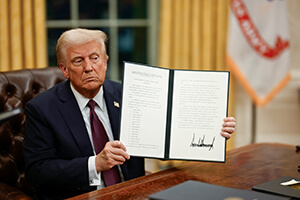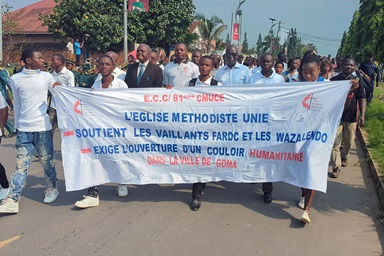Key Points:
- As President Trump returns to office, some United Methodists are preparing to respond to new policies, while others are hoping common ground is still possible amid hostility over immigration and other issues.
- The Western North Carolina Conference’s Purple Church Initiative is trying to find a starting place for dialogue between conservative and progressive United Methodists.
- A Duke University study of North Carolina churches found that United Methodism is still “a big tent” with politically diverse members, despite an exodus of churches over sexuality issues.
Most children know that if they scribble blue crayon and then red on top of it, they’ll get the color purple.
In the Western North Carolina Conference, United Methodist leaders are hoping that formula works when it comes to politics. There, the Purple Church Initiative is trying to find a starting place for dialogue and middle ground between conservative and progressive United Methodists. The effort is especially important as U.S. President Donald Trump begins his second term after a four-year interim, in a time of heightened political tension.
Avoiding the issues won’t do, said Beth Crissman, Uwharrie District superintendent and director of peace-building ministries in the Western North Carolina Conference.

“We absolutely have got to talk about politics,” Crissman said. “But before we can have a prophetic voice, and it be a healthy prophetic voice, it’s got to be rooted in a relationship that is, first and foremost, committed to the love of God and love of neighbor.
“And that means being able to enter into the contentious spaces and the diversity that’s there, knowing how to speak the truth, and love in ways that build up and do not tear down.”
Climate change, economic disparities and social issues divide Americans, and Christians, today. But immigration seems the most urgent concern, since President Trump has made it clear that the mass deportation of undocumented immigrants is at the top of his agenda. Shortly after his inauguration, he revoked a policy that prohibited arrests by U.S. immigration agents at places of worship and other “sensitive locations,” and his administration paused the refugee resettlement program.
“We have to have a prophetic voice responding to the policies and the practices that will impact racial and cultural minorities in this country,” said the Rev. Giovanni Arroyo, top executive of the United Methodist Commission on Religion and Race. “The concern for our immigrant siblings is very well into the realm of xenophobia, and we are very committed to addressing xenophobia.”
Various United Methodist organizations have weighed in on Trump’s plans:
- In a statement Jan. 21, the Immigration Law and Justice Network — a United Methodist ministry that provides low-cost legal services to immigrants — said it “denounces” immigration measures President Trump put into place with executive orders. “Trump’s Day One invokes laws and policies from the most shameful corners of American history. He has reinstated the Alien Enemies Act via an executive order. This is the same law used to round up and imprison innocent Japanese American families here in the United States during World War II. Another horrific executive order makes any undocumented person a target by requiring everyone to register with our federal government. This is exactly what Arabs and Muslims were required to do post-Sept. 11.”
- In a Jan. 13 statement, the United Methodist Board of Church and Society said it “vehemently opposes the mass deportation plans put forth by President-elect Trump. These proposals are not only antithetical to the foundational values of our democracy but also starkly contradict The United Methodist Church’s Social Principles on immigration and the Wesleyan theological tradition.”
- In a Dec. 18 statement signed by Council of Bishops President Tracy S. Malone, the bishops said, “We are living in a dark time that more than ever calls us to be the light of Christ, people of faith who take our baptismal vow to ‘resist evil in all its forms’ with utmost seriousness. As United Methodists we have firmly declared through our Social Principles that we are called to actively welcome the migrant, immigrant and refugee among us.”
- In a statement Dec. 2, Roland Fernandes, top executive of the United Methodist Board of Global Ministries and United Methodist Committee on Relief, said longtime work to support immigrants and refugees will continue. “As the United States faces … the likely mass deportation of thousands of migrants, Global Ministries and UMCOR will prioritize protecting migrants’ rights, reaffirming a longstanding commitment to core humanitarian principles. We will intensify efforts to amplify the voices of migrants and create pathways for integration.”
Danilo Zak is director of policy at Church World Service, a United Methodist-supported ecumenical partner and one of the 10 refugee resettlement agencies in the U.S. under a cooperative agreement with the State Department. He hopes Christians know they can still make a difference.
“In 2019, when the family separation crisis happened, it was faith leaders, alongside many others, who were calling out against family separations,” Zak said. “That ultimately stopped those actions from continuing.”
The church’s stance on immigration
The revised Social Principles adopted by the 2024 United Methodist General Conference state:
“We affirm the dignity, worth and rights of migrants, immigrants and refugees, including displaced and stateless people. … We urge United Methodists to welcome migrants, refugees and immigrants into their congregations and to commit themselves to providing concrete support, including help with navigating restrictive and often lengthy immigration policies, and assistance with securing food, housing, education, employment and other kinds of support. We oppose all laws and policies that attempt to criminalize, dehumanize or punish displaced individuals and families based on their status as migrants, immigrants or refugees.”
Despite the passion reflected in statements to help undocumented immigrants and refugees, Crissman cites a 2024 Duke University study showing United Methodism in North Carolina still casts a wide net that includes people who likely are supportive of the Trump administration’s immigration stance. The same is likely true elsewhere, even though many conservative United Methodists left the denomination in a period of disaffiliations beginning in 2019, amid debate about the status of LGBTQ members in church life.
“After a historic exodus of conservative pastors and congregations, remaining churches in the two annual conferences of the North Carolina United Methodist Church have become more rather than less politically diverse,” read a summary of the Duke Religion and Social Change Lab study.
“With partisan conflict at an all-time high, the findings suggest a timely opportunity for the denomination to embrace its ‘Big Tent’ roots and seed communities where plurality without division can thrive.”
There are United Methodists who are pleased with Trump’s election and plans to deport undocumented immigrants.
“I would support the deportation of illegal immigrants who have committed a felony in the United States, but not the deportation of the ‘dreamers’ or other immigrants who are law-abiding and contributing members to the well-being of their communities, remembering the words of Jesus: ‘I was a stranger and you welcomed me’ (Matthew 25:35),” said the Rev. Kent Millard, president of United Theological Seminary. He said he was speaking for himself, not the seminary. “In our divided nation, we all need to remember the words of Jesus to ‘love your enemies and pray for those against you (Matthew 5:44).’”
Crissman believes that Christians with opposing political views should seek out common ground.
“We are a purple church,” she said. “We were before disaffiliation. We continue to be after disaffiliation.”
Subscribe to our
e-newsletter
Other United Methodist leaders also are calling for a more measured, respectful debate on immigration and other issues. United Women in Faith is asking its members to sign a pledge to work together toward “a long-term vision of racial justice, climate justice and gender justice, putting one foot in front of the other even when it’s an uphill climb.”
The pledge also makes a commitment “to love kindness” and “to walk humbly with our God, in prayer and action.”
Sally Vonner, top executive of United Women in Faith, said “it’s not limited to any particular (political) party.”
“Certainly there are concerns, there are fears, there’s anxiety,” Vonner said. “But we feel like in this joining together to sign this pledge that we can move forward … to what the work and the mission for United Women in Faith has called us to for over 155 years now.”
Crissman believes being purple “is something to celebrate.”
“It is something that does need to help shape our life and ministry together, and presents specific opportunities on how we do that,” she said.
Other annual conferences have checked in with her about the Purple Church Initiative, Crissman said.
“We’ve had multiple conferences who have tapped in and utilized the antiracism resources,” she said. “We’ve actually had a (Catholic) diocese reach out as well as both Episcopal and Presbyterian churches.
Patterson is a UM News reporter in Nashville, Tennessee. Contact him at 615-742-5470 or [email protected]. To read more United Methodist news, subscribe to the free Daily or Weekly Digests.




